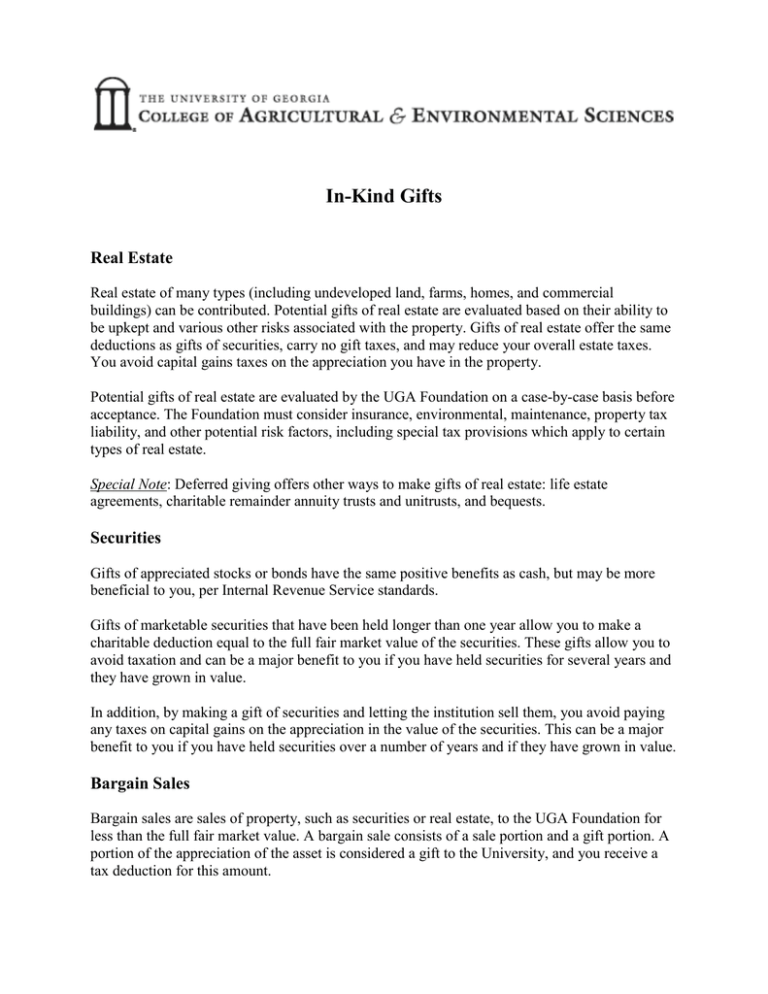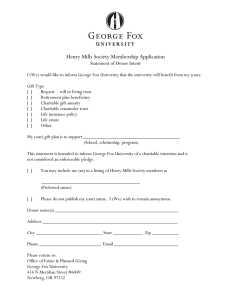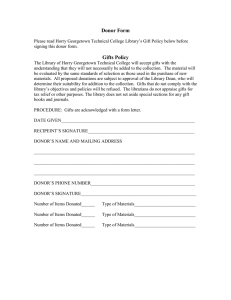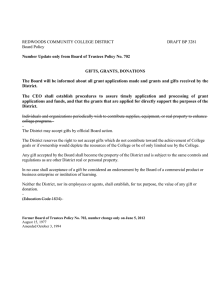In-Kind Gifts Real Estate
advertisement

In-Kind Gifts Real Estate Real estate of many types (including undeveloped land, farms, homes, and commercial buildings) can be contributed. Potential gifts of real estate are evaluated based on their ability to be upkept and various other risks associated with the property. Gifts of real estate offer the same deductions as gifts of securities, carry no gift taxes, and may reduce your overall estate taxes. You avoid capital gains taxes on the appreciation you have in the property. Potential gifts of real estate are evaluated by the UGA Foundation on a case-by-case basis before acceptance. The Foundation must consider insurance, environmental, maintenance, property tax liability, and other potential risk factors, including special tax provisions which apply to certain types of real estate. Special Note: Deferred giving offers other ways to make gifts of real estate: life estate agreements, charitable remainder annuity trusts and unitrusts, and bequests. Securities Gifts of appreciated stocks or bonds have the same positive benefits as cash, but may be more beneficial to you, per Internal Revenue Service standards. Gifts of marketable securities that have been held longer than one year allow you to make a charitable deduction equal to the full fair market value of the securities. These gifts allow you to avoid taxation and can be a major benefit to you if you have held securities for several years and they have grown in value. In addition, by making a gift of securities and letting the institution sell them, you avoid paying any taxes on capital gains on the appreciation in the value of the securities. This can be a major benefit to you if you have held securities over a number of years and if they have grown in value. Bargain Sales Bargain sales are sales of property, such as securities or real estate, to the UGA Foundation for less than the full fair market value. A bargain sale consists of a sale portion and a gift portion. A portion of the appreciation of the asset is considered a gift to the University, and you receive a tax deduction for this amount. Charitable Lead Trusts A donor creates a Charitable Lead Trust by transferring ownership of an asset to a trust. The trust gives the income, or a percentage of the income, to the UGA Foundation each year for a period of years (usually 15-20). At the end of the period of years, the trust assets are given back to the donor or to named beneficiaries. The lead trust typically is used with assets with a potential for continued high appreciation. The trust permits the assets to be transferred to other family members at a low transfer cost. Utilizing the lead trust, the donor may leave a significantly larger inheritance to his or her heirs than he or she could have left via a will or other trusts. Tangible Personal Property Note: Historically, rules pertaining to the charitable deduction for works of art have changed from year to year. Please check the current year's deduction before making any decisions. When the donor is the creator of a work of art, the donor's tax deduction is limited to the cost of creating that item. There are two main categories of tangible personal property: 1. Items related to the University's purpose, and 2. Items not related to the University's purpose. Gifts of related-use items allow the donor an income tax charitable deduction of the appraised value of the gift on the date of the gift (up to 30% of the donor's adjusted gross income with the five-year carry-over provision). Gifts of unrelated items allow the donor a deduction only of the item's cost basis. Every potential gift item of tangible personal property is evaluated on an item-by-item basis by the Office of Gift & Estate Planning to determine if it is related-use property. Please consider a gift of cash or securities to provide for the maintenance of special collections.



